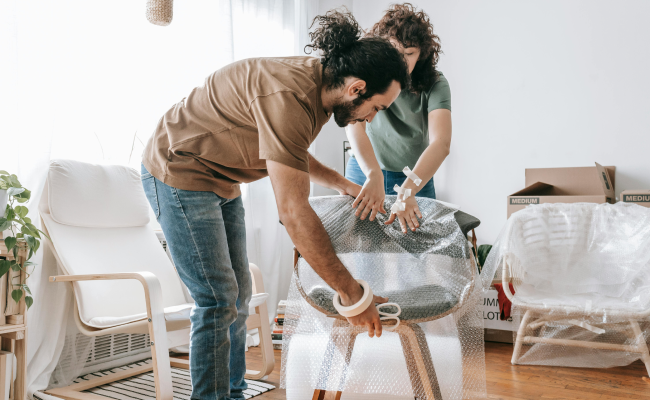Typically, you don’t start thinking about additional storage until it becomes essential. Then, you make the mistake of visiting or calling the most convenient location without giving much thought to services and amenities. Here at Trusted Self-Storage, we have a courteous, professional staff that is always ready to explain your options and provide you with an outstanding storage experience.
Gather Materials
Not sure where to begin? The key is preparation and organization. If you take the time to plan early, you won’t have as much to worry about on moving day.
- Estimate the number of boxes you’ll need as well as packing material (packing paper, bubble wrap, foam shipping noodles), tape, and markers. Many of our locations sell packing and moving supplies so we can help with this.
- Use strong, new or almost new, boxes. Don’t use boxes from grocery and liquor stores. They may be harboring insects or rodents and they’re probably in a weakened condition.
Inventory
- Create an inventory list of your items and keep copies in a safe place away from the unit.
- Identify which items you may need to access while they are in storage.
Prep Your Space
- Measure and estimate the collective packing size of the items you plan to store.
- To keep items off the unit floor, use furniture pads or cover the floor under your belongings.
Arrange Boxes for Convenience and Safety
- Be sure your boxes are strong enough to hold 25-30 pounds (don’t overpack)
- Account for extra space to provide ventilation and ease of access.
- Think about arranging for easy access. Plan for anything that you use think you need frequently to be placed in the front of your unit.
- Place boxes that contain fragile or delicate items on top of boxes packed with heavier, sturdier things.
- If you’re storing business files, leave a pathway for easier access.
- List contents on all four sides of boxes and seal tightly with good quality packing tape.
Hazardous Materials and Perishable Items
- It is prohibited to store flammable, hazardous or combustible materials (paint, paint thinner, gasoline, propane).
- Drain fuel from lawnmowers, snowblowers, trimmers, or any other equipment that you may be storing.
- You are also prohibited from storing perishable items, such as food or even pet food. These can attract rodents and insects.
Extra Space
- Furniture with drawers can be utilized to store linens and small items. Even fragile items can be stored in drawers if wrapped properly. Don’t forget to carefully wrap linens in acid free paper to prevent staining or deterioration.
Fragile Items
- Large pictures and mirrors should be wrapped in cardboard, marked “FRAGILE” and stacked on end.
- China, crystal, porcelain, and any other breakable items should be carefully wrapped in packing paper and/or bubble wrap and boxes should be marked “FRAGILE.” These boxes should be stacked on top of the heavier items.
Appliances and Electronics
- Large appliances make excellent packing space for blankets, towels, bedding, table linens, and even heavy clothing.
- To prevent accidental damage, place TVs and other electronics in the rear of your unit.
Utility and Gardening Items
- Shovels, hoes, rakes, and hoses can be stored in clean, empty trash cans. You can also stack cans inside each other.
Sofas, Chairs, and Love Seats
- Sofas and love seats can be stored on end to save floor space.
- Wrap cushions in plastic furniture covers and place on top of sofas.
- Cover everything with furniture covers or pads to prevent dust.
- Don’t place sharp or heavy objects on upholstered or leather furniture.
- Wrap furniture legs in furniture covers or pads to prevent damage.
- If you need to store any furniture that can be broken down, keep small parts in plastic bags and tape them to the item.
Tables
- Break down tables that have removable legs to save space. Cover with furniture covers or pads to prevent damage.
- Never cover or wrap wood items with plastic. It can leave a residue that causes permanent damage.
Beds and Mattresses
- If you store mattresses on their sides, prop them up so that they stand straight. This will prevent them from bending and becoming out of shape and lumpy.
- If you are breaking down a bed frame, be sure to keep all small parts in a plastic bag and tape it to the frame.
Metal Items
- Wipe metal items such as bikes, tables and tools with machine oil to prevent rust and corrosion.
We hope these tips help you and relieve some of your stress. Remember, call us with any questions. We’re always here for you and your belongings!

